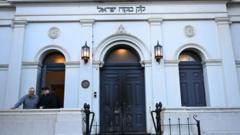Australia's Prime Minister Anthony Albanese has taken a strong stance against antisemitism following a recent arson attack on a synagogue in Melbourne. The incident occurred as approximately 20 individuals were enjoying dinner inside when a man reportedly doused the synagogue's front door with a flammable liquid before igniting it on Friday night. Fortunately, all those present escaped without injury. Law enforcement is currently investigating potential connections between this attack and another incident that targeted a Jewish-owned restaurant in the city the same evening.
This wave of antisemitic acts has intensified in Australia in recent months, particularly in response to the ongoing conflict between Israel and Hamas. Following the attack on the synagogue, Prime Minister Albanese declared, "Antisemitism has no place in Australia," reinforcing the government's commitment to address these crimes with stringent measures. The government has already appointed a special envoy dedicated to combating antisemitism and has enacted tougher laws against hate crimes.
Amidst these tensions, protests have sparked among both Jewish and Muslim communities in Australia, with an alarming increase in hate directed towards both groups. The latest incidents have raised concerns about escalating violence, with remarks from Alex Ryvchin, co-chief executive of the Executive Council of Australian Jewry, noting, "These events are a severe escalation directed towards our community."
Critics, including Israel's Foreign Minister Gideon Saar, emphasize that more robust action is needed to eradicate antisemitism, describing it as a "toxic disease" threatening societal harmony. As violence continues in Gaza with a staggering death toll reported, the political consequences of the Middle Eastern conflict are increasingly reverberating within Australia, accentuating the fragility of community relations.




















